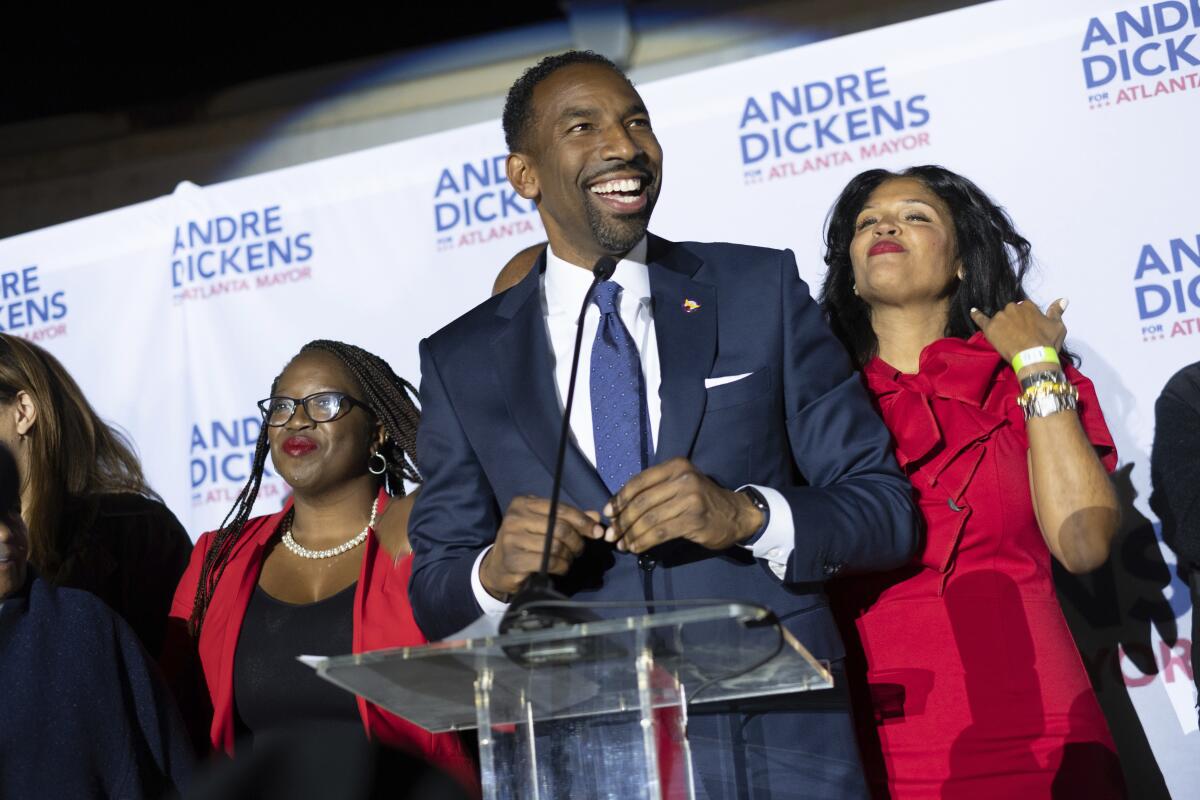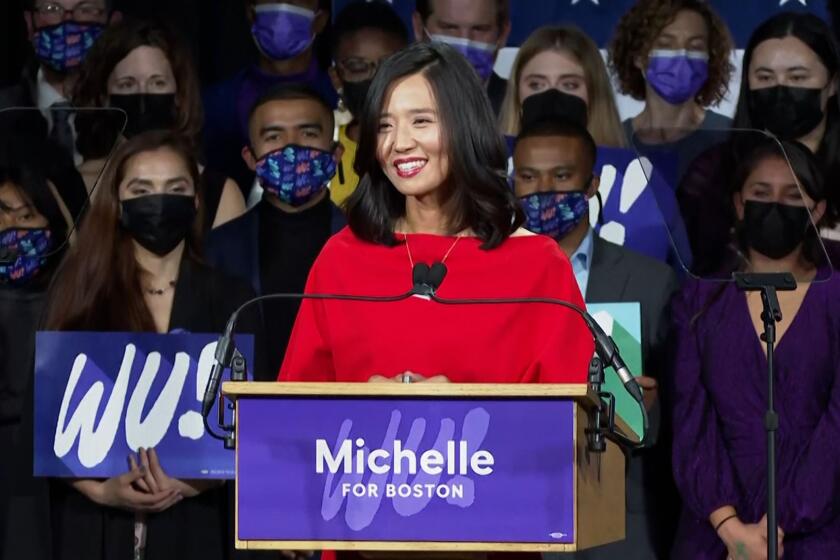Once trailing the pack, Atlanta councilman wins mayoral race

- Share via
ATLANTA — City Councilman Andre Dickens won a runoff election Tuesday to become Atlanta’s next mayor, riding a surge of support that powered him past the council’s current president, Felicia Moore, after finishing second to her in November.
Dickens won a campaign dominated by concern over rising violent crime in the city, arguing that he would be more effective than Moore, who has often been a lonely critic of previous mayors in her 20 years on the City Council. Moore had been the leading candidate by a wide margin in the first round of voting Nov. 2 among 14 candidates in a nonpartisan race.
Mayor Keisha Lance Bottoms created a wide-open succession race when she announced in May that she wouldn’t seek a second term.
The 47-year-old Dickens, an Atlanta native and engineer by training, joined the council in 2013. He argued that his broad range of experience would allow him to address crime and other city issues, including affordable housing and improving opportunity for poorer residents. Other issues in the race included bolstering struggling city services and keeping the wealthy Buckhead neighborhood from seceding.
“We voted for progress and a problem-solver, for a bridge-builder, for transformation,” Dickens told a crowd of hundreds during his victory speech Tuesday night. “And this work will start right now. We can’t wait any longer to address these issues.”
Dickens went from trailing the pack to take second Nov. 2 and make the runoff, ending the comeback attempt of two-term former Mayor Kasim Reed, who finished third. That snowballing support for Dickens continued in the runoff, with endorsements by Bottoms, U.S. Rep. and Democratic Party of Georgia Chair Nikema Williams, Fulton County Dist. Atty. Fani Willis and Sharon Gay, an attorney who finished fourth in the Nov. 2 vote.
Michelle Wu has been sworn in as Boston’s first woman and first person of color to be elected mayor in the city’s history.
“I draw circles — I don’t draw lines,” Dickens said. “And the circle tonight got real large.”
Like many cities across the country, Atlanta has been dealing with a spike in killings. As of Nov. 13, homicides rose 10% over the same period last year and 57% compared with 2019, Atlanta police data show. Several of those killings captured widespread attention, including the shooting deaths of several people at Atlanta-area spas.
Dickens has pledged to increase the number of police officers, arrest gang leaders and implement community policing. He says he may keep current Police Chief Rodney Bryant, who came out of retirement in 2020 after a previous chief stepped down following a fatal police shooting of a Black man that led to unrest.
Dickens also wants to increase affordable housing, improve infrastructure and ensure that current residents qualify for high-paying jobs. He acknowledged the city’s problems Tuesday night, but then pivoted to optimism about the Atlanta’s ability to change.
For many Asian Americans, the killings further fueled fears about anti-Asian hatred that has mounted over the last year as police and advocacy groups have reported record numbers of hate crimes and harassment.
“Like they say, Atlanta influences everything,” Dickens said. “And it’s time that we use that influence to make some real change. Atlanta needs to show the world that we are leading, that we are leading on public safety, on criminal justice reform, that we are leading on affordable housing and eliminating the inequality that we have.”
Moore, 60, made a call for unity in her concession speech, saying there’s no difference between her supporters and Dickens’ because “we’re all Camp Atlanta.”
“We have to be called to do the thing that we wanted everyone else to do, and that’s bring this city together,” Moore said, specifically exhorting Buckhead residents to work with Dickens and spurn secession and for Dickens to make sure he gives access to all groups.
Alexander Dawes, 25, said he voted for Dickens, saying that Dickens’ transparency and his stance on public safety were key factors in his decision.
Start your day right
Sign up for Essential California for the L.A. Times biggest news, features and recommendations in your inbox six days a week.
You may occasionally receive promotional content from the Los Angeles Times.
“I think there are multiple approaches to address crime,” Dawes said. “Of course, staffing is important but also having officers present in the community. That’s important to build back that trust between the police and the community.”
Jennifer and Joe Moyers, both 60, said they voted for Moore. She was the candidate who had the most focus on curbing crime, Jennifer Moyers said.
Some of Moore’s critics attacked her as the favorite of white voters, a frequent tactic in a city where many white and Black voters are divided by income and geography. Both Moore and Dickens are Black. Moore dismissed the notion that her support should be held against her.
Moore touted her record to appeal to voters hungry for change and position herself as someone who would bring accountability and transparency to City Hall. But Dickens portrayed Moore as a naysayer and someone who has been unable to work with others.
Dickens currently works for TechBridge, a nonprofit that tries to use technology to aid other charitable groups. He also founded a program to train people for technology work, trying to broaden access to high-paying jobs in Atlanta.
He earlier ran a family-owned furniture store chain that collapsed in bankruptcy a decade ago, something that Dickens blamed on the effects of the Great Recession.
More to Read
Sign up for Essential California
The most important California stories and recommendations in your inbox every morning.
You may occasionally receive promotional content from the Los Angeles Times.











